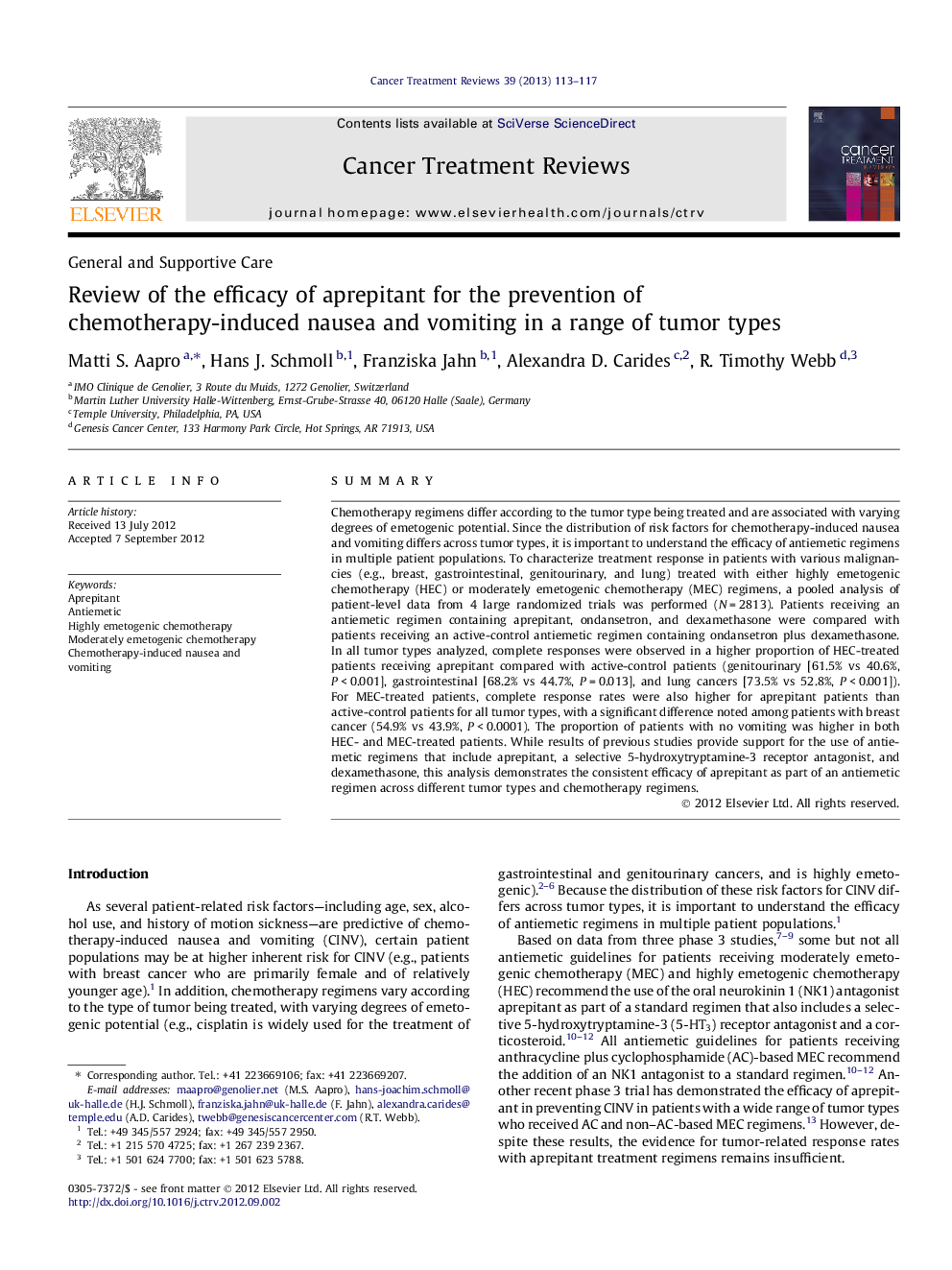| کد مقاله | کد نشریه | سال انتشار | مقاله انگلیسی | نسخه تمام متن |
|---|---|---|---|---|
| 6190683 | 1257414 | 2013 | 5 صفحه PDF | دانلود رایگان |
عنوان انگلیسی مقاله ISI
Review of the efficacy of aprepitant for the prevention of chemotherapy-induced nausea and vomiting in a range of tumor types
ترجمه فارسی عنوان
بررسی اثر آپپرتیانت برای پیشگیری از تهوع و استفراغ ناشی از شیمیدرمانی در انواع مختلف انواع تومور
دانلود مقاله + سفارش ترجمه
دانلود مقاله ISI انگلیسی
رایگان برای ایرانیان
کلمات کلیدی
آپپرتیانت، ضد عفونی کننده شیمی درمانی بسیار شیمیایی شیمی درمانی مؤثر تهوع و استفراغ ناشی از شیمی درمانی،
موضوعات مرتبط
علوم پزشکی و سلامت
پزشکی و دندانپزشکی
تومور شناسی
چکیده انگلیسی
Chemotherapy regimens differ according to the tumor type being treated and are associated with varying degrees of emetogenic potential. Since the distribution of risk factors for chemotherapy-induced nausea and vomiting differs across tumor types, it is important to understand the efficacy of antiemetic regimens in multiple patient populations. To characterize treatment response in patients with various malignancies (e.g., breast, gastrointestinal, genitourinary, and lung) treated with either highly emetogenic chemotherapy (HEC) or moderately emetogenic chemotherapy (MEC) regimens, a pooled analysis of patient-level data from 4 large randomized trials was performed (NÂ =Â 2813). Patients receiving an antiemetic regimen containing aprepitant, ondansetron, and dexamethasone were compared with patients receiving an active-control antiemetic regimen containing ondansetron plus dexamethasone. In all tumor types analyzed, complete responses were observed in a higher proportion of HEC-treated patients receiving aprepitant compared with active-control patients (genitourinary [61.5% vs 40.6%, PÂ <Â 0.001], gastrointestinal [68.2% vs 44.7%, PÂ =Â 0.013], and lung cancers [73.5% vs 52.8%, PÂ <Â 0.001]). For MEC-treated patients, complete response rates were also higher for aprepitant patients than active-control patients for all tumor types, with a significant difference noted among patients with breast cancer (54.9% vs 43.9%, PÂ <Â 0.0001). The proportion of patients with no vomiting was higher in both HEC- and MEC-treated patients. While results of previous studies provide support for the use of antiemetic regimens that include aprepitant, a selective 5-hydroxytryptamine-3 receptor antagonist, and dexamethasone, this analysis demonstrates the consistent efficacy of aprepitant as part of an antiemetic regimen across different tumor types and chemotherapy regimens.
ناشر
Database: Elsevier - ScienceDirect (ساینس دایرکت)
Journal: Cancer Treatment Reviews - Volume 39, Issue 1, February 2013, Pages 113-117
Journal: Cancer Treatment Reviews - Volume 39, Issue 1, February 2013, Pages 113-117
نویسندگان
Matti S. Aapro, Hans J. Schmoll, Franziska Jahn, Alexandra D. Carides, R. Timothy Webb,
